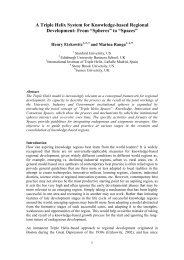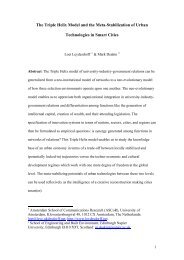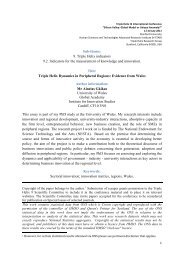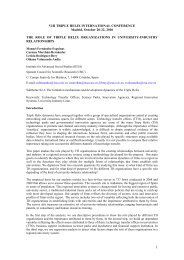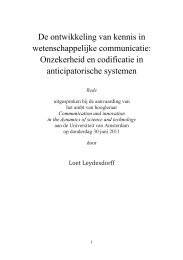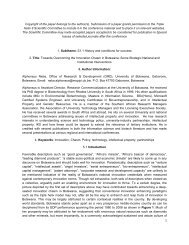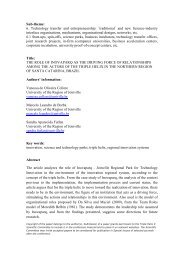TRIPLE HELIX noms.pmd
TRIPLE HELIX noms.pmd
TRIPLE HELIX noms.pmd
You also want an ePaper? Increase the reach of your titles
YUMPU automatically turns print PDFs into web optimized ePapers that Google loves.
O-015Stages of Development of Enterprise-University Cooperation in BrazilianMultinationalPriscila Rezende Da Costa, Geciane Silveira Porto, Universidade De São Paulo, Brazil1. Expanded SummaryThe concept of innovation has widened and the current challenge involves not only the generation of innovative products andprocesses, but the continuous search for innovative solutions. The analysis of the innovation process, before focusing only onthe linear generation of new knowledge, also suffered many changes and today covers the development of dynamic and open toproduce, implement, distribute and share knowledge, skills and technologies (BERKHOUT et al., 2006; LEYDESDORFF,MEYER 2006; LEYDESDORFF et al., 2006; ETZKOWITZ, 2004; ETZKOWITZ; LEYDESDORFF, 2000; CHESBROUGH;CROWTER, 2006).In innovation, it is remarkable the importance of another subject, called internationalization. Initially, the international operationsof companies is restricted to productive activities, but in today's innovation activities are also carried out abroad, and these inturn are held in subsidiaries or in partnership with universities and research institutes abroad (ASPELUND; MOEN, 2005;DUNNING, 2002; CHIESA, 2000; PATEL, PAVITT, 1998; GASSMANN; ZEDTWITZ, 2006).The joint assessment of the issues "innovation and internationalization," specifically considering their empirical and theoreticaldevelopments, leading to the observation that innovation must be managed dynamically and their understanding should includenot only the analysis of innovative activities that are developed by internal R & D companies (parent and subsidiaries), butshould primarily involve the evaluation of open innovation activities, especially the interactions that can be wedged betweencompanies, universities and research institutes, national and international.Considering this scenario, in which cooperation is seen as an alternative to boost the innovation performance of organizationsseeking out new technological advances on a global scale, the paper proposes to determine their stage of development ofuniversity-enterprise cooperation in the Brazilian multinationals. Specifically, we sought to (a) review administrative practicesadopted by Brazilian multinationals in the management of cooperation, (b) whether they are structured cooperation activities inthe headquarters and the subsidiaries of these corporations and (c) indicate in general terms the stages of development ofuniversity-enterprise cooperation.To achieve these objectives was performed a descriptive qualitative study using multiple cases. The companies studied in depthwere Embraco, Gerdau, Smar, Tigre and WEG. For the interpretation of primary and secondary data used to document analysisand content. The primary data were collected through semi-structured interviews and questionnaires, and secondary schoolswere obtained from reports and organizational documents and also secondary sources of evidence, such as newspapers,periodicals, conference proceedings and on the websites of the organizations studied.The survey results show that Brazilian multinationals studied, despite adopting some practices structured to manage technologypartnerships have yet to evolve considerably when it comes to the management of university-enterprise cooperation, with someexceptions, such as Embraco and WEG, which has have structured management models for cooperation. Note also that moreefficient practices of evaluation need to be developed by multinationals studied, so that the real return on cooperative projectscan be measured. In the specific case of Gerdau, Smar and Tigre, and the most efficient evaluation will also need to implementmore elaborate practices of selection, planning and monitoring to ensure that partnerships with external sources of technologycan really be leveraged, and better managed. For the structuring of cooperative activities, it was found that the subsidiaries ofmultinational companies studied have autonomy to manage their partnerships, and monitor the arrays, except for arrays ofGerdau and Smar. Partnerships subsidiaries are commonly associated with specific projects that result in technological adaptation.Regarding the stages of development of university-enterprise cooperation, we identified the mature stages, intermediate andembryonic. In the mature stage, the cooperative projects have great relevance in science and technology, and a formal governancemodel is adopted to balance the technology needs of business and scientific interests of the university. In the intermediatestage, the cooperative projects continually enhance the internal R & D and although in some formal management practices,there is a management model formally structured. In the embryonic stage, the cooperative projects on time enhance the internalR & D and are taken predominantly informal administrative practice, which undermines the structure of a formal managementmodel for university-enterprise cooperation.Madrid, October 20, 21 & 22 - 2010281



